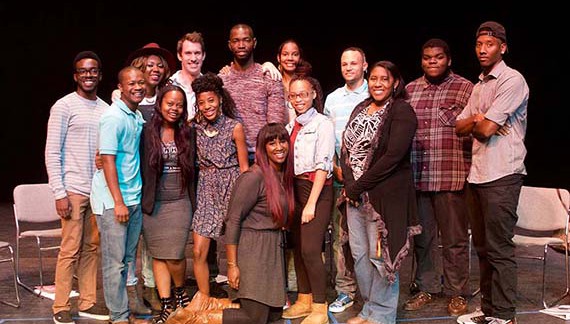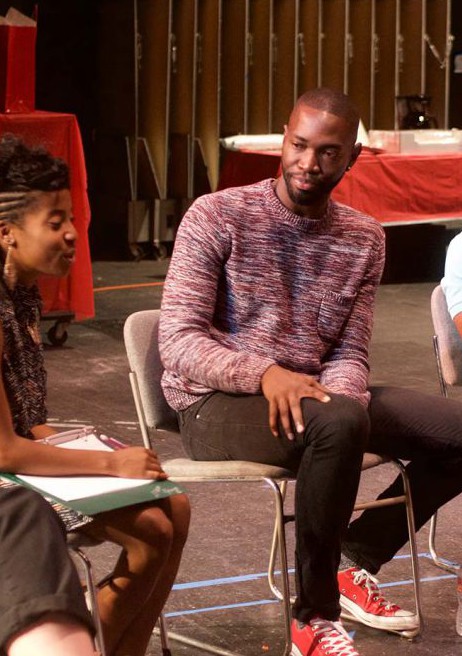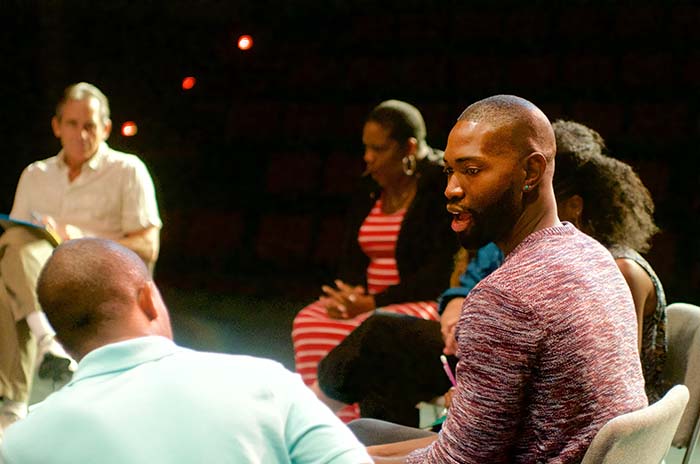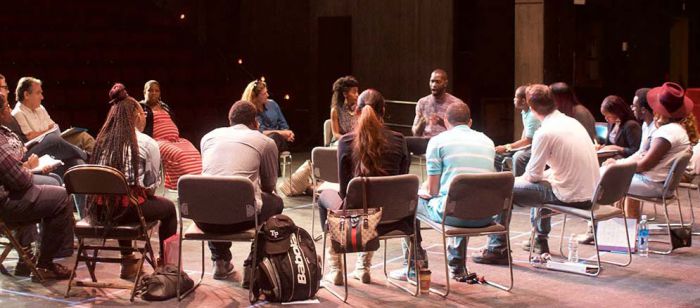
Theatre arts students at California State University, Dominguez Hills (CSUDH) who are the cast and stage team in the upcoming university’s production of Tarell Alvin McCraney’s acclaimed play “In the Red and Brown Water” were treated to a rare examination of the play when the celebrated playwright stopped by campus for a visit.
The play will run in CSUDH’s University Theatre, Nov. 13-16, performed by students in the Department of Theatre Arts and Dance, and members of the Performance Studies and Arts Research Collective, which was created by assistant professor of theatre Sharrell Luckett, who began teaching at the university in 2013.
Consisting of theatre, dance, biology, business, psychology, communication, education, mathematics, and music students, the collective is intended to engage students in opportunities that spark life-long learning as they investigate the ways in which the arts, humanities and the sciences connect. The program also encourages students to explore graduate school options.

“I believe that research and creative activity are inextricably linked. The collective approaches the students’ creative activity as research, and their research with scholarship that is written, verbally expressed, and performative,” said Luckett, who will direct “In the Red and Brown Water” at CSUDH. Tarell graciously gave us his time because I shared with him the amazing work and passion of the students in the play and in the collective in regards to research and dramaturgy.”
A Circle of Thespians
McCraney, who earned his Master of Fine Arts at the Yale School of Drama and received both the MacArthur Genius Fellowship and the coveted Windham-Campbell Literature Prize in 2013, joined the student cast members and Luckett in a circle on the stage of the University Theatre to discuss the play and his craft.
“In the Red and Brown Water” is a play in McCraney’s trilogy “The Brother/Sisters Plays,” which includes “The Brothers Size” and “Marcus; or the Secret of Sweet.” The series has been described as “gritty coming-of-age stories” of love, self-sacrifice and kinship that stems from McCraney’s youth living in a poor neighborhood in Miami, where he was raised by his mother.
“In the Red and Brown Water” weaves West African Yoruba cosmology into a contemporary story, and invites the members of the audience to interact with the cast as they speak their lines directly to them. The protagonist, Oya, is a promising runner looking to make something of herself as she struggles between helping her ill mother and pursuing her goals, while trying to stay afloat in life’s deep and murky “waters.”
Before McCraney arrived on campus, the students had prepared questions for him, but his audibly-low and casual style quickly developed into a comfortable and free-flowing discussion of the play.
Megan Stewart, a theatre arts and dance major, who had heard “In the Red and Brown Water” was McCraney’s favorite play in the series, asked him why.
“In the Red and Brown Water” will take place in CSUDH’s University Theatre.
– Nov. 13 and 14 at 8 p.m.
– Nov. 15 at 3 p.m. and 8 p.m.
– Nov. 16 at 2 p.m.
To purchase tickets, please visit http://www4.csudh.edu/theatre-arts/buy-tickets/index.
“It’s good, it’s real good. First of all, when I say ‘favorite,’ it’s like when parents saying who their favorite kids are. You don’t love them less, you just have a better time with them,” he said. “There’s so much that isn’t on the page that people get excited about and want to engage in. The play is exquisite in that way. It is very open and I had to fight hard to keep it that way because a lot of theatres were like ‘Why don’t you construct it in a way that’s much more linear?’ I’m like, ‘Forget that!’ The way it came to me–I rarely write like that, and I haven’t written like that for an entire play in a long time. I literally felt like I woke up and the play was just there.”
Anthony Brown, theatre arts, asked where McCraney got the inspiration to develop the character Elegba, who he is portraying.
“When you grow up you realize there’s always some trickster in your life [like Elegba] who says the weirdest things at the weirdest times. You’re like ‘Why do you do that?’ …There is one in every type of cosmology. That person introduces you into a conflict, and then you have to make a choice,” said McCraney. “The story of Elegba, Oya, Shango and the others are all stories I grew up with. They come from children I knew growing up in Miami. I lived in Liberty City and was washed in different cultural stories, and some of them were from Yoruba cosmology. As a kid I would think, ‘That god is very similar to that god, which is similar to Hercules.’ So I started putting these cosmologies together and they have lived in my head all my life.”
Vincent Richmond, theatre arts, asked McCraney to describe his playwright style, particularly in terms of “In the Red and Brown Water.” McCraney turned the question into advice for the cast regarding the play’s unique performance style.

“This play isn’t meant to break the focus of the audience, it’s supposed to invite, which is a little different. You [the cast] never have to go ‘Now I have to think about this thing.’ It’s about inviting you to stop focusing on those things and to be there,” explained McCraney. “I’m helping guide you through the story. I’m not asking you to remove yourself. I’m asking you to come in. The actor telling the story should be looking at the audience and talking to them. The moment you can’t see them, when you have to pretend you’re looking a people, the ball is dropped.”
Byronique Goodes, theatre arts, was curious why several lines throughout the play were repeated, and sometimes by different characters. McCraney explained that the play just developed in that way, and that “it’s more about” how the play relates to each actor’s contribution to the performance.
“The only thing you can bring to the forum is you. This story is thousands of years old. It’s one you can find in every cosmology around the world. What’s new to it for me was my perspective, and now that it’s on paper, it’s not new anymore,” said McCraney. “So the only new thing or life that can be brought to it is your interpretation and where it speaks to you. Know what it evokes in you. If there’s something there then activate it in a full way, think about it, and figure out what it means to you on an intellectual basis, as well as the physical. Where does it hit you in the body? It is your job to investigate that fully with your whole self.”
Brandon Stern, theatre arts, asked when McCraney realized he could make a living being a professional playwright.
“It’s very recent that I realized I could do it professionally. Since my first job in the theater, I’ve always had to write, direct and act,” he said. “I was 13 years old and I got a job working for an improve troupe. We were doing street theatre, gorilla-type theatre on the trains of Miami, and getting arrested while just trying out new tactics and forms. By the time I was an undergraduate, my professors were constantly stunned with how much information and experience I already had.”
“Do you have doubts about how your work will be perceived to different audiences, and how do you overcome them?” asked Stewart.
“I have doubts. I have sincere doubts–crippling doubts. I don’t overcome them. The day I do I will probably not work anymore. You need them. They’re necessary. You need to know that something might not go through,” he said.
“The hardest part is convincing people to bring their full self to every line, every time, and to mean it. That is the job of the play,” McCraney added. “I guarantee you, there will be a day when you’re as tired as hell, when you come out and you’re like, ‘Let me just do this.’ Then you lock in and you make eye contact; you do your lines and you mean them when you say them. Then you walk off stage and think ‘Oh, it’s that simple.’ But that simplicity is hard. So bring your full self to the lines and see what happens.”

Tarell McCraney